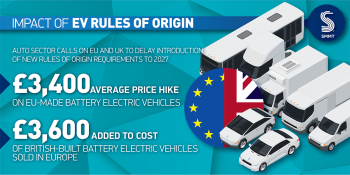UK fleets buying EU-made battery electric vehicles face a £3,400 average price hike from 2024 unless an urgent post-Brexit deal on trade tariffs is signed.

As the clock ticks down to the 1 January introduction of tougher ‘rules of origin’, the Society of Motor Manufacturers and Traders (SMMT) is urging the EU and UK to strike an immediate agreement to delay the tariffs.
The rules, set under the EU-UK Brexit deal, place minimum restrictions on all battery parts and some battery raw materials to ensure they’re locally sourced within the EU or UK. These get tougher from 2024.
The rules were meant to stop the threat of cheap imports – but could now have a severe impact on vehicle affordability and competitiveness as manufacturers in both the UK and the EU have said they’re not able to meet the more stringent targets yet.
Under the current threshold, 30% of batteries and 40% of the content of electric vehicles must originate from the EU or the UK.
But from 1 January 2024, this increases to 50-60% for batteries and 45% of the vehicle. Electrified vehicles that do not meet the new thresholds will be subject to a 10% tariff when traded across the Channel, resulting in a combined cost of £4.3bn.
For consumers – including fleets – this could mean an average price hike of £3,400 on EU-manufactured battery electric vehicles (BEVs) bought by British buyers, and a £3,600 rise on UK-made BEVs sold in Europe. The percentages will also increase further from 2027, rising to 65% for batteries and 55% for vehicles.
With almost half (49.1%) of all new BEVs registered in the UK in the first half of the year coming from the EU, any cost increase would act as a barrier to uptake, undermining their competitiveness in an important and growing market.
Conventional ICE models are unaffected on both sides – meaning the new requirements will have the unintended effect of incentivising the purchase of fossil fuel-powered vehicles, while putting electric vehicle competitiveness, the EV transition and net zero ambitions at risk.
Both the SMMT in the UK and the European Automobile Manufacturers’ Association (ACEA) have warned that the restrictive requirements are practically impossible and already called for delays.
Now, the SMMT is warning that the EU and UK must strike an immediate agreement as the tougher rules – agreed before the pandemic, war in Ukraine and supply shortages – come into force in just 75 days’ time.
It says that a three-year postponement would be a “pragmatic” solution – providing the necessary time for EU and UK gigafactories to come on stream as well as helping the development of local battery parts and critical mineral supply chains.
The UK auto sector also says that a postponement could be readily achieved within the existing EU-UK Trade Cooperation Agreement (TCA) post-Brexit framework, avoiding formal re-negotiation.
Speaking at a major SMMT global trade conference today, Mike Hawes, SMMT chief executive, commented: “UK Automotive is a trading powerhouse delivering billions to the British economy, exporting vehicles and parts around the world, creating high-value jobs and driving growth nationwide.
“Our manufacturers have shown incredible resilience amid multiple challenges in recent years, but unnecessary, unworkable and ill-timed rules of origin will only serve to set back the recovery and disincentivise the very vehicles we want to sell. Not only would consumers be out of pocket, but the industrial competitiveness of the UK and continental industries would be undermined. A three-year delay is a simple, common-sense solution which must be agreed urgently.”
The SMMT also launched its Open Roads – Driving Britain’s Global Automotive Trade report at today’s conference. The report outlines the critical importance of worldwide trade to the UK automotive sector with key recommendations to assure growth, jobs and prosperity in the coming years.

